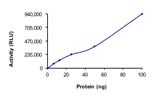
DGKQ, Active (D29-10G)
FOR BULK ORDER REQUESTS PLEASE CONTACT US
Description :Recombinant full-length human DGKQ was expressed by baculovirus in Sf9 insect cells using an N-terminal GST tag.
Species :Human
Tag :GST tag
Expression System:Sf9 insect cells using baculovirus
Sequence :Full length
Genbank Number :NM_001347
Specific Activity :Sample Kinase Activity Plot. For specific information on a given lot, see related technical data sheet.
Purity :Sample Purity Data. For specific information on a given lot, see related technical data sheet.
Storage, Stability, and Shipping :Store product at –70oC. For optimal storage, aliquot target into smaller quantities after centrifugation and store at recommended temperature. For most favorable performance, avoid repeated handling and multiple freeze/thaw cycles.
Applications :Kinase Assay
Molecular Weight :130 kDa
Gene Aliases :DAGK; DAGK4; DAGK7
Scientific Background :Diacylglycerol kinase theta (DAG kinase theta) is the only member of class V diacylglycerol kinase, which contains three cysteine-rich domains, a proline-rich region, and a Ras-associating domain and mediates the regeneration of phosphatidylinositol from diacylglycerol in cell signal transduction (1). DGKQ has been associated with Parkinson’s disease in a genome-wide meta-analysis study (2). Stimulated DGK theta activity promotes the SF1-dependent transcription of CYP17 in human adrenocortical cells (3).
References :
1. Houssa, B. et al. Cloning of a Novel Human Diacylglycerol Kinase (DGK theta) Containing Three Cysteine-rich Domains, a Proline-rich Region, and a Pleckstrin Homology Domain with an Overlapping Ras-associating Domain. The Journal of Biological Chemistry. (272) 10422–10428, 1997.
2. Nalls, M. et al. Large-scale meta-analysis of genome-wide association data identifies six new risk loci for Parkinson’s disease. Nature Genetics. (46) 989-993, 2014.
3. Li, Donghui. et al. Cyclic AMP-Stimulated Interaction between Steroidogenic Factor 1 and Diacylglycerol Kinase theta Facilitates Induction of CYP17. Molecular and Cellular Biology. (27) 6669–6685, 2007.
Product Sheets (By Lot #) :
Research Areas :Apoptosis/Autophagy, Cancer, Cardiovascular Disease, Cell Cycle, Inflammation, PKA/PKC Pathway
